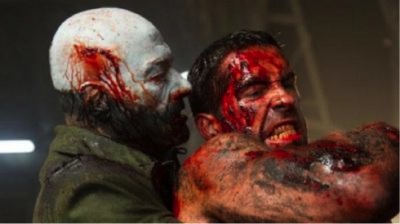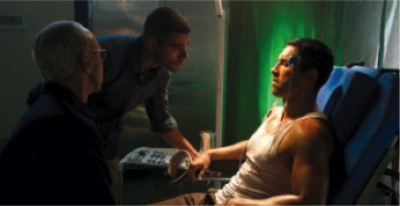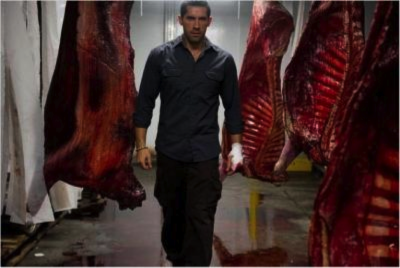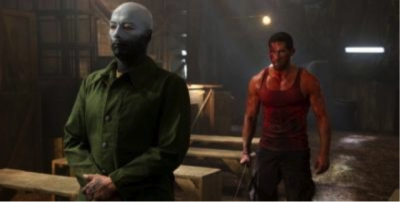By: debbie lynn elias
UNIVERSAL SOLDIER: DAY OF RECKONING is the latest chapter in the ongoing saga of the Unisols – a cloned “master race” of soldiers ready to do the bidding of whatever government agency or force has domination over them. Presiding over the more advanced Unisols than those seen in the past, is the evil and formidible Luc Deveraux [Jean-Claude Van Damme] and his right-hand devotee raised from the dead, Andrew Scott [Dolph Lundgren]. Devereaux and Andrew have created their own rogue army of Unisols for take over of the government and obviously, the world. But this time we have “John” standing in their way. The victim of a home invasion and attack led by Deveraux in which John’s wife and daughter are brutally murdered before his eyes, on awakening from a coma and filled with the painful memories of the executions, John vows vengeance on Devereaux, setting the story in motion.
Stepping into the shoes of “John” is action actor, Scott Adkins, who moves into action superstar level with his performance here. With an increasing acting and action profile, the most recent of which was as Jean-Claude Van Damme’s right-hand man in Expendables 2 and starring in the “After Dark Action” film series western El Gringo with Yvette Yates, Adkins looks like not only an heir apparent for the action genre, but for the UNIVERSAL SOLDIER franchise. Making the transition with not only his fighting styles and complex choreography, Adkins commands the screen, blending acting and action, eliciting genuine emotion, and here capturing the pain of a father and husband with tacitly soulful reflective expressiveness.
I had a chance to speak with Scott this week in an up close and personal one-on-one about acting, action and ACLs.

Since we talked for Expendables 2, I have been chomping at the bit just waiting for this film to come out – UNIVERSAL SOLDIER: DAY OF RECKONING. It was worth the wait because you blew my mind.
Oh, thanks very much.
You have three of what I think are some of the finest man-on-man choreographed fight scenes I have ever seen on film.
Oh, that’s great, that’s great to hear. We put 100% into it so I’m glad it worked out.
Dolph [Lundgren] and John [Hyams] have nothing but praise for you and your skills. How challenging is it, and how much input did you have, into choreographing these three specific fights – the one with Jean-Claude [Van Damme], the one with Dolph and then the one with Andre [Arlovski]?
All of the praise must go to our fight coordinator, Larnell Stovall. I’ve worked with him a couple of times before and he surely is the best at what he does. He comes up with all of it. Now, I can have some input on certain things and I normally do, because it’s a collaboration, but I wouldn’t want to take anything away from him. But also, John [Hyams] as a director, he really understands how to cut [edit] action. What I love about John’s style is he loves to see things getting smashed apart and general chaos and destruction of the set. And, of course, that adds so much value to us performers in the midst of it all. So, the praise has got to go to those guys.
I know that your primary disciplines throughout your life has been the martial arts area. You’ve got a lot of other elements that now come into play – I saw it in El Gringo, I saw it in Expendables 2 – other different type of fighting styles coming in. Is that easy for you to adapt and integrate?
It’s getting to that point now where I don’t want to repeat myself so I need to try and try different things. So we’re always searching for a new kick or new style of fighting. But you always try and adapt it to the script. A lot of what we did with UNIVERSAL SOLDIER was adapting to the fact that I tore my ACL in my knee and I wasn’t able to do all the jumping kicks that I normally do – which we were going to do in the fight with myself and Jean-Claude. But because of my injury, it changed the shape of that fight and it became this thing about gaining control of the machete. But I think it all worked out. When you see the film, you can’t really tell.
I would have never had any idea and never would have known that you had an ACL injury.
Oh good. Yeah, I couldn’t walk six weeks before we started shooting.
How much do you love your physical therapist and orthopedist? [laughing]
Oh well, at the time I had a great physio. My ligament was cut in half and I did UNIVERSAL SOLDIER, El Gringo, Metal Hurlant Chronicles and then Expendables 2, all with a damaged knee. I knew that once I had the operation, I had to take at least six months off. All these films were coming my way that I didn’t want to turn down, especially Expendables. So I decided to just grin and bear it.

Since you did UNIVERSAL SOLIDER first and then you did Expendables, how is it working where on one side you‘re going against Jean-Claude as a foe and on the next film you‘re on the same side. And you, as a boy, he was one of your idols growing up, something you had mentioned to me at the last press day. Is that very surreal for you now playing both sides of the fence and actually working with Jean-Claude?
Yes. It’s very surreal. The first time I met him was a huge moment for me. He’s a massive idol, huge inspiration. The first film I did with him was Shattered and I was the bad guy. We were foes. The second film I did with him, Assassination Games, we were foes and then we team up a little bit again at the end. And again we’re foes in UNIVERSAL SOLDIER so it as nice for me to do the Expendables and be on the same team. You have all the Expendables – there’s Arnie and Sly and Bruce Willis and Dolph and Randy [Couture] and the rest of them. So, we really tried to look after each other because it was us [Jean-Claude and Scott] against them. And of course, we had a good comaraderie by then. It’s a pleasure to be working with all those guys.
You’re still a relative newcomer in the action-adventure arena. But it’s very clear with UNIVERSAL SOLDIER that this franchise is set up for you to become the heir apparent and take the reins should they decide to make some more. Have you been working towards something like that? Getting established as an action franchise star?
I can’t say there’s any master plan. You just try to take the best role that’s on offer at the time. You don’t want to take any old thing. There comes a time in the year where it’s, “Okay. It’s been three months now and I guess I better go and work again.” So you take the best project that’s on the table at the time. Are they going to do another UNIVERSAL SOLDIER? I don’t know. I don’t have an answer there. There’s been no talk about it. I think we need to see what the public thinks about it with this new installment and see if we can move on from there.

What is about the UNIVERSAL SOLDIER franchise that has appeal for you as an actor to come in with these established and see the film now grow in its progression of story?
The biggest appeal for me was to work with John Hyams because when I saw Universal Soldier: Regeneration, I was amazed at what the guy did. I’ve worked in Bulgaria a lot. I knew all the guys that he was working with. And I knew how long [a time] he had to shoot in and he did a phenomenal job, so that was the first thing. Debbie, the appeal for me [the franchise story] is that modern day re-telling of the Frankenstein story, isn’t it. Playing God and creating these monsters that are inevitably going to come back and wreck havoc on the guys that created them. And that’s just a great concept – the monster movie – and when you put the action guys into that realm it can be quite exciting. Certainly John as a director wanted to delve more into that side of the monster that’s let loose, but see it from[the monster’s] point of view. So that’s a very compelling story point to have “John”, this new guy who doesn’t know anything about who he is and he’s got a memory of Van Damme wiping out his wife and child and he’s consumed by this vengeance. As the audience follows this character through the film, the audience discovers things as he discovers them. That was really compelling. The way the script was written was really good. John [Hyams] was trying to do something different with the franchise. He didn’t want to just do the same thing that had come before it. He really wanted to try and do something different and I think he needs to be commended for that.
I think he did an amazing job with restructuring and taking the story and concept in this direction because it opens the story up so wide and it really opens up the character of John as to where in the future they could take the story should they decide to do so.
Definitely. I think it was a smart move to have the opening of the film as it is, seeing it from “John’s” point of view. The audience is experiencing the only memory he has as graphically as it is in his own mind and it certainly sets the film up very well.
Talking about the opening of the film, it’s one thing to go toe-to-toe and have blood splatters and weaponry and explosions everywhere with “the guys”. But when you have a little child in a scene as you do here, and you’re executing it, how does that impact you?
I’ve got a little daughter. I think when they wrote it, it was one thing. When it comes to shooting it on the day you have to take into account, “Yes, there’s a little girl involved in this scene and we don’t want to scare her.” It’s a bold move from a bold director and I can certainly see how some people might be put off by that. But John likes to shock people and I like to shock people as well. I think it’s just a balls to the wall, psychological action movie and I’m really proud of the film.
You also have the sequence where you are playing opposite yourself. How do you get into that mindset? Obviously the John that we’ve been watching from the beginning of the film is more advanced, has a degree of free will and can think for himself. How do you prepare to face yourself and the style in which John [Hyams] shot that sequencing?
We actually shot, let’s call him John 1 – the previous John, the guy that’s actually in the hut – we shot that sequence first because he’s really the character that’s driving the scene. He’s the character with the most dialogue anyway. We shot that first on the first day and then on the second day I played the “other John”. In terms of making the two characters different, that was a little bit tricky because they’re pretty much exactly the same. It’s not like they’re twins. They are two separate people. But they are the same person. The only difference is the one guy has – and I don’t want to give anything away, but… – a different memory and a different proportion to the other guy. What we tried to play around with is that all these Universal Soldiers [Unisols] have got this void within them, this emptiness and this craving to just fill it with something because it’s so depressing to them to know that they’re not real, that they’re clones, that they’ve got no identity. That’s why they’re turning to drink. And that’s why that character [John] has turned to drugs. You can see that he’s got these scars on his arm; hefs self -harming himself. He’s completely self-destructive. We just wanted to show a character that was the same person but further down the road and more abused and more degraded and more depressed and at the end of his time.

This character – actually both Johns, even though one talks a little more – and your roles in El Gringo and Expendables, you don’t have a lot of dialogue. So much of the content and story we get about you and your characters is through your eyes and your facial expressiveness. Do you like that portion of the acting and using that as a tool as opposed to being dialogue-heavy?
I think if you don’t need it, you can get rid of it. Steve McQueen was famous for it, wasn’t he. Steve McQueen was famous for getting rid of his dialogue. He said that he’d think if he could say it with a look, then he would. Of course that’s the job of acting, isn’t it. It’s not to say the lines. It’s to be in the moment, be that character and express yourself truthfully on screen. Whether you’ve got a lot of dialogue or you haven’t, you’re still doing the same thing.
What did you learn about yourself in the process of making UNIVERSAL SOLDIER: DAY OF RECKONING? This is a much more high profile role for you and the bulk of this film, you‘re carrying.
Although it wasn’t the first film I’ve been the lead in, it’s probably the most expensive film that I’ve been the lead of. I remember when we were filming the car chase and they blocked off all the roads and I was on the back of the truck and trailer, and all these roads blocked off while I’m leading this film, so I thought, “I better do a good job.” There’s definitely more pressure. But, I feel like itfs my time to move up anyway. I feel like I’m ready for it. I feel I belong to be there. I learned that I’m ready for it. I’m ready to take on any of these guys!
You step into the shoes quite nicely, Scott, and I for one, am thrilled to see you moving up to this level.
Oh, thank you.
What do you have coming up next?
Some films already filmed that are coming out. Zero Dark Thirty, the Kathryn Bigelow film.
Is there anything that you are allowed to say about that?
I can’t talk about the film. It’s an ensemble cast and I’m by no means the star. I’m very happy to come on board that and work with Kathryn, of course. No brainer! No brainer! They didn’t want to send me a script. I said, “I don’t need to see one [anyway]. I’ll do it.” I’ve got another film coming out with Dolph Lundgren. At the moment I’m filming a British film which is a football hooligan film, so that’s great to do a British film for a change. And I’m going to do Ninja 2 in January in Thailand.
Try not to get yourself hurt! I want you around for a long time to come! I know that injury is part of the game with all stunts, but trust me, the end result that you consistently deliver and that you delivered here, is well worth it.
I always get hurt, Debbie, but I’ll try not to! The fights wouldn’t be as good if I didn’t. [laughing]
#












